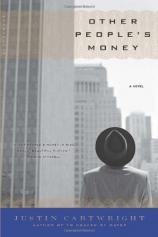Reading Group Guide
Discussion Questions
Other People

1. Other People’s Money opens with two quotations: one from the economist John Maynard Keynes, and one about Henri Matisse’s art studio. How do these two quotations reflect different aspects the novel? How do the worlds of finance and art come together in Other People’s Money?
2. “The Trevelyan-Tubals are not so much at home with their surroundings as the masters of their surroundings” (4). Compare the properties owned by the Trevelyan-Tubal family: the villa in Antibes, Mulgrave House in London, and Julian and Kimberly’s home in Notting Hill. How do these houses reflect the values and personalities of the various members of the family?
3. Compare the business philosophies of Harry and Julian. What does each of them want for Tubal and Co.? What professional mistakes has each made? How does Julian start to resemble his father as the sale of Tubal and Co. is threatened?
4. How do reality and fantasy shape the two worlds within Other People’s Money: art and banking? How has the financial industry fallen “in thrall to fables” (80), and what forms of fantasy does Artair MacCleod pursue in his artistic life? Who has a better grip on reality in the novel: the bankers or the artists?
5. Discuss the relationship of Julian and Simon, the two heirs of the Tubal family. How does Simon evolve in his role as “the hippy Tubal or the hairy heir” (10) after his father’s funeral? Why does Julian resent Simon? Does Simon seem conscious of his brother’s feelings? Why or why not?
6. Consider the character of Melissa Tregarthen, who rises from a novice blogger to an accidental investigative journalist. What attracts Melissa to the Tubal scandal, and what concerns does she have about her role in it? How do Melissa and her boss, Edward Tredizzick, approach the investigation differently? What stake does each of them have in the scandal?
7. Julian plans to build a life for his children that will be “free of Olde England” (76). Why is Julian so determined to distance himself from his family’s past? What price does he pay for his efforts to break free?
8. As Fleur considers her romantic history, from theater director to banker to personal trainer, she wonders, “Where does Morné fit into this pattern?” (115) What kind of men is Fleur attracted to? How does Bryce fit into --- or break --- her romantic pattern?
9. Although the novel takes place after Harry’s debilitating stroke, his personality can be seen from his loved ones’ opinions of him. What kind of man was Harry in his prime? What were his strengths and weaknesses as a banker, as a husband, and as a father?
10. Trace the route of Harry’s favorite Matisse painting, “French Window at Collioure,” as it changes hands throughout the novel. Which characters want the legendary painting for its artistic, monetary, or sentimental value?
11. Two women are anxious about their position within the Trevelyan-Tubal family: Fleur and Estelle. How does each of them handle Harry’s illness and death? Discuss how Julian figures out --- and takes advantage of --- Estelle’s secret wish: “All she ever wanted was to be part of the family” (171).
12. Consider the Trevelyan-Tubal’s long family’s history, from Jewish immigrants to London’s elite. What anxieties of origin can still be felt in the family? Why does Julian wind up in Israel at the end of the novel?
13. Discuss the significance of the title Other People’s Money. Melissa reports, “She read that in the dealing rooms they would shout ‘OPM’ gleefully as a deal went bad: Other people’s money” (158). Do the bankers of the novel handle people’s money so frivolously? Explain.
14. Discuss the setting of the novel, which takes place during the financial collapse of 2008. How does the novel re-create the scene and mood of that year? Which themes transcend this specific time and place?
15. According to Flann O’Brien’s At Swim-Two-Birds, “There are beginnings and there are ends, and there are also many ways of telling the same story” (249). Discuss the end of Other People’s Money. Whose lives turn out well, and what consequences do others face for their wrongdoings?
Other People
- Publication Date: April 12, 2011
- Paperback: 272 pages
- Publisher: Bloomsbury USA
- ISBN-10: 1608192733
- ISBN-13: 9781608192731







